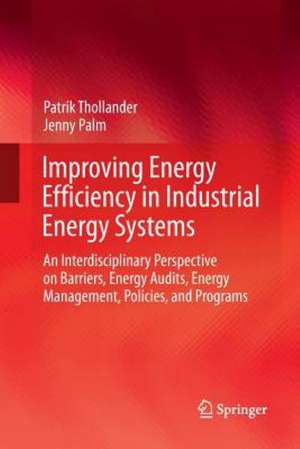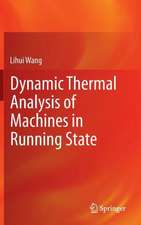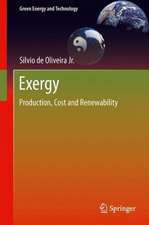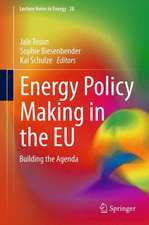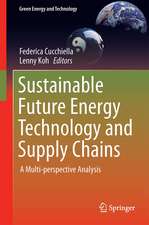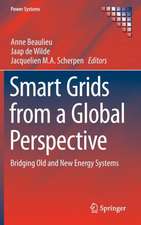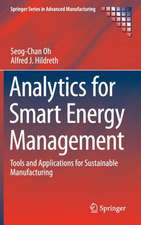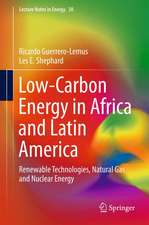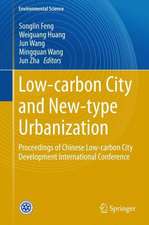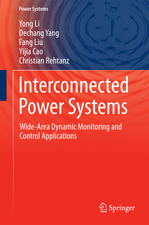Improving Energy Efficiency in Industrial Energy Systems: An Interdisciplinary Perspective on Barriers, Energy Audits, Energy Management, Policies, and Programs
Autor Patrik Thollander, Jenny Palmen Limba Engleză Paperback – 19 sep 2014
Improving energy efficiency in industrial energy systems applies an interdisciplinary perspective in examining energy efficiency in industrial energy systems, and discusses how “cross-pollinating” perspectives and theories from the social and engineering sciences can enhance our understanding of barriers, energy audits, energy management, policies, and programmes as they pertain to improved energy efficiency in industry.
Apart from classical technical approaches from engineering sciences, Improving energy efficiency in industrial energy systems couples a sociotechnical perspective to increased energy efficiency in industry, showing that industrial energy efficiency can be expected to be shaped by social and commercial processes and built on knowledge, routines, institutions, and methods established in networks. The book can be read by researchers and policy-makers, as well as scholars and practicians in the field.
“This book is extremely valuable for anyone who is designing or executing energy efficiency policies, schemes or projects aiming at SMEs. Both authors deserve the highest respect, and the combination of their expertise makes the results truly unique.” - Daniel Lundqvist, programme manager at the Swedish energy agency
“For anyone interested in improving energy efficiency in industry, this is a must-read. The book combines tools from social science and engineering to discuss the state of art today as well as possible development path tomorrow. This is a compelling book that I find useful both in my teaching and my research.” - Kajsa Ellegård, Professor at Linköping University, Sweden
"The book Improving energy efficiency in industrial energy systems is a novel approach on how improved levels of energy efficiency can be reached in industrial energy systems by merging engineering with social sciences. It is with delight that I can recommend their book to anyone interested in the field.”- Mats Söderström, Director Energy Systems Programme, Linköping University, Sweden
| Toate formatele și edițiile | Preț | Express |
|---|---|---|
| Paperback (1) | 884.22 lei 6-8 săpt. | |
| SPRINGER LONDON – 19 sep 2014 | 884.22 lei 6-8 săpt. | |
| Hardback (1) | 888.63 lei 6-8 săpt. | |
| SPRINGER LONDON – 9 aug 2012 | 888.63 lei 6-8 săpt. |
Preț: 884.22 lei
Preț vechi: 1078.31 lei
-18% Nou
Puncte Express: 1326
Preț estimativ în valută:
169.22€ • 176.01$ • 139.70£
169.22€ • 176.01$ • 139.70£
Carte tipărită la comandă
Livrare economică 14-28 aprilie
Preluare comenzi: 021 569.72.76
Specificații
ISBN-13: 9781447159957
ISBN-10: 1447159950
Pagini: 172
Ilustrații: XVI, 156 p.
Dimensiuni: 155 x 235 x 9 mm
Greutate: 0.25 kg
Ediția:2013
Editura: SPRINGER LONDON
Colecția Springer
Locul publicării:London, United Kingdom
ISBN-10: 1447159950
Pagini: 172
Ilustrații: XVI, 156 p.
Dimensiuni: 155 x 235 x 9 mm
Greutate: 0.25 kg
Ediția:2013
Editura: SPRINGER LONDON
Colecția Springer
Locul publicării:London, United Kingdom
Public țintă
ResearchDescriere
Industrial energy efficiency is one of the most important means of reducing the threat of increased global warming. Research however states that despite the existence of numerous technical energy efficiency measures, its deployment is hindered by the existence of various barriers to energy efficiency. The complexity of increasing energy efficiency in manufacturing industry calls for an interdisciplinary approach to the issue.
Improving energy efficiency in industrial energy systems applies an interdisciplinary perspective in examining energy efficiency in industrial energy systems, and discusses how “cross-pollinating” perspectives and theories from the social and engineering sciences can enhance our understanding of barriers, energy audits, energy management, policies, and programmes as they pertain to improved energy efficiency in industry.
Apart from classical technical approaches from engineering sciences, Improving energy efficiency in industrial energy systems couples a sociotechnical perspective to increased energy efficiency in industry, showing that industrial energy efficiency can be expected to be shaped by social and commercial processes and built on knowledge, routines, institutions, and methods established in networks. The book can be read by researchers and policy-makers, as well as scholars and practicians in the field.
“This book is extremely valuable for anyone who is designing or executing energy efficiency policies, schemes or projects aiming at SMEs. Both authors deserve the highest respect, and the combination of their expertise makes the results truly unique.” - Daniel Lundqvist, programme manager at the Swedish energy agency
“For anyone interested in improving energy efficiency in industry, this is a must-read. The book combines tools from social science and engineering to discuss the state of art today as well as possible development path tomorrow. This is a compelling book that I find useful both in my teaching and my research.” - Kajsa Ellegård, Professor at Linköping University, Sweden
"The book Improving energy efficiency in industrial energy systems is a novel approach on how improved levels of energy efficiency can be reached in industrial energy systems by merging engineering with social sciences. It is with delight that I can recommend their book to anyone interested in the field.”- Mats Söderström, Director Energy Systems Programme, Linköping University, Sweden
Improving energy efficiency in industrial energy systems applies an interdisciplinary perspective in examining energy efficiency in industrial energy systems, and discusses how “cross-pollinating” perspectives and theories from the social and engineering sciences can enhance our understanding of barriers, energy audits, energy management, policies, and programmes as they pertain to improved energy efficiency in industry.
Apart from classical technical approaches from engineering sciences, Improving energy efficiency in industrial energy systems couples a sociotechnical perspective to increased energy efficiency in industry, showing that industrial energy efficiency can be expected to be shaped by social and commercial processes and built on knowledge, routines, institutions, and methods established in networks. The book can be read by researchers and policy-makers, as well as scholars and practicians in the field.
“This book is extremely valuable for anyone who is designing or executing energy efficiency policies, schemes or projects aiming at SMEs. Both authors deserve the highest respect, and the combination of their expertise makes the results truly unique.” - Daniel Lundqvist, programme manager at the Swedish energy agency
“For anyone interested in improving energy efficiency in industry, this is a must-read. The book combines tools from social science and engineering to discuss the state of art today as well as possible development path tomorrow. This is a compelling book that I find useful both in my teaching and my research.” - Kajsa Ellegård, Professor at Linköping University, Sweden
"The book Improving energy efficiency in industrial energy systems is a novel approach on how improved levels of energy efficiency can be reached in industrial energy systems by merging engineering with social sciences. It is with delight that I can recommend their book to anyone interested in the field.”- Mats Söderström, Director Energy Systems Programme, Linköping University, Sweden
Cuprins
The Interconnection Between STS and Barriers to Industrial Energy Efficiency.- Barriers to Energy Efficiency – Earlier Research and Theoretical Baseline.- Science and Technology Studies – Earlier Research on Socio-Technical Transition and Theoretical Baseline.- Improving Energy Efficiency – Using an Interdisciplinary Perspective.- Integrating STS and Barrier Perspective – Methodological Implications.- Apply a Combined STS and Barrier Perspective on Industrial Energy Efficiency – Policy Implications.- Implications for EU's 2020-Goals.- Concluding Discussion.
Notă biografică
Dr Patrik Thollander is an assistant professor of energy systems in the Department of Management and Engineering at Linköping University. Patrik is conducting research related to energy efficiency in industrial energy systems. In addition to this, he is involved in courses in energy systems, modeling, auditing, and industrial energy systems. He is also active in the the national interdisciplinary research program, Program Energy Systems.
Jenny Palm is professor and deputy head of the unit Technology and Social Change at the department of Thematic studies at Linköping University. Her research is interdisciplinary and includes how to improve energy efficiency in industry by combining barriers theories with theories from the STS-field (Science Technology Society). She is also active in the national interdisciplinary research program, Program Energy Systems.
Jenny Palm is professor and deputy head of the unit Technology and Social Change at the department of Thematic studies at Linköping University. Her research is interdisciplinary and includes how to improve energy efficiency in industry by combining barriers theories with theories from the STS-field (Science Technology Society). She is also active in the national interdisciplinary research program, Program Energy Systems.
Jenny Palm is professor and deputy head of the unit Technology and Social Change at the department of Thematic studies at Linköping University. Her research is interdisciplinary and includes how to improve energy efficiency in industry by combining barriers theories with theories from the STS-field (Science Technology Society). She is also active in the national interdisciplinary research program, Program Energy Systems.
Jenny Palm is professor and deputy head of the unit Technology and Social Change at the department of Thematic studies at Linköping University. Her research is interdisciplinary and includes how to improve energy efficiency in industry by combining barriers theories with theories from the STS-field (Science Technology Society). She is also active in the national interdisciplinary research program, Program Energy Systems.
Textul de pe ultima copertă
Industrial energy efficiency is one of the most important means of reducing the threat of increased global warming. Research however states that despite the existence of numerous technical energy efficiency measures, its deployment is hindered by the existence of various barriers to energy efficiency. The complexity of increasing energy efficiency in manufacturing industry calls for an interdisciplinary approach to the issue.
Improving Energy Efficiency in Industrial Energy Systems applies an interdisciplinary perspective in examining energy efficiency in industrial energy systems, and discusses how “cross-pollinating”perspectives and theories from the social and engineering sciences can enhance our understanding of barriers, energy audits, energy management, policies, and programmes as they pertain to improved energy efficiency in industry.
Apart from classical technical approaches from engineering sciences, Improving Energy Efficiency in Industrial Energy Systems couples a sociotechnical perspective to increased energy efficiency in industry, showing that industrial energy efficiency can be expected to be shaped by social and commercial processes and built on knowledge, routines, institutions, and methods established in networks. The book can be read by researchers and policy-makers, as well as scholars and practicians in the field.
“This book is extremely valuable for anyone who is designing or executing energy efficiency policies, schemes or projects aiming at SMEs. Both authors deserve the highest respect, and the combination of their expertise makes the results truly unique.” - Daniel Lundqvist, program manager at the Swedish Energy Agency
“For anyone interested in improving energy efficiency in industry, this is a must-read. The book combines tools from social science and engineering to discuss the state of art today as well as possible development path tomorrow. This is a compelling book that I find useful both in my teaching and my research.” - Kajsa Ellegård, professor at Linköping University, Sweden
"The book Improving Energy Efficiency in Industrial Energy Systems is a novel approach on how improved levels of energy efficiency can be reached in industrial energy systems by merging engineering with social sciences. It is with delight that I can recommend their book to anyone interested in the field.”- Mats Söderström, director Energy Systems Program, Linköping University, Sweden
Improving Energy Efficiency in Industrial Energy Systems applies an interdisciplinary perspective in examining energy efficiency in industrial energy systems, and discusses how “cross-pollinating”perspectives and theories from the social and engineering sciences can enhance our understanding of barriers, energy audits, energy management, policies, and programmes as they pertain to improved energy efficiency in industry.
Apart from classical technical approaches from engineering sciences, Improving Energy Efficiency in Industrial Energy Systems couples a sociotechnical perspective to increased energy efficiency in industry, showing that industrial energy efficiency can be expected to be shaped by social and commercial processes and built on knowledge, routines, institutions, and methods established in networks. The book can be read by researchers and policy-makers, as well as scholars and practicians in the field.
“This book is extremely valuable for anyone who is designing or executing energy efficiency policies, schemes or projects aiming at SMEs. Both authors deserve the highest respect, and the combination of their expertise makes the results truly unique.” - Daniel Lundqvist, program manager at the Swedish Energy Agency
“For anyone interested in improving energy efficiency in industry, this is a must-read. The book combines tools from social science and engineering to discuss the state of art today as well as possible development path tomorrow. This is a compelling book that I find useful both in my teaching and my research.” - Kajsa Ellegård, professor at Linköping University, Sweden
"The book Improving Energy Efficiency in Industrial Energy Systems is a novel approach on how improved levels of energy efficiency can be reached in industrial energy systems by merging engineering with social sciences. It is with delight that I can recommend their book to anyone interested in the field.”- Mats Söderström, director Energy Systems Program, Linköping University, Sweden
Caracteristici
Reconsiders the traditional view of studying industrial energy efficiency in both a barrier perspective and a STS-perspective
Presents the theoretical baselines and implications for both research and policy of how industrial energy efficiency might be addressed
Combines engineering and social science approaches to enhance readers' understanding of industrial energy efficiency and broaden their perspective on policy making in the area
Presents the theoretical baselines and implications for both research and policy of how industrial energy efficiency might be addressed
Combines engineering and social science approaches to enhance readers' understanding of industrial energy efficiency and broaden their perspective on policy making in the area
